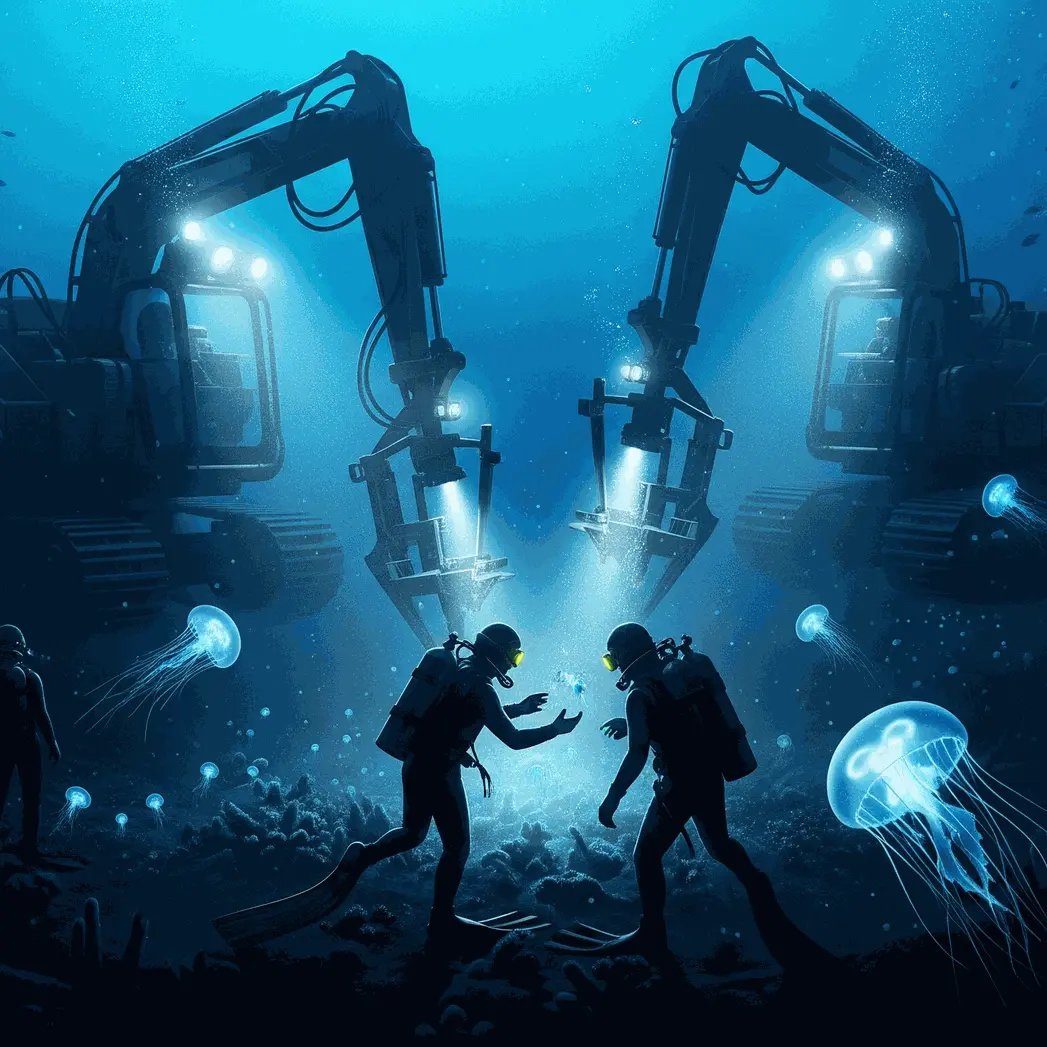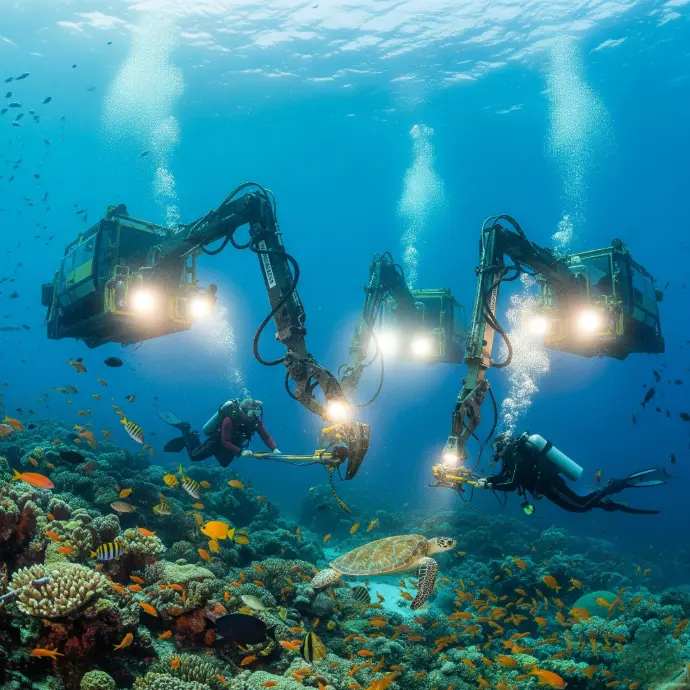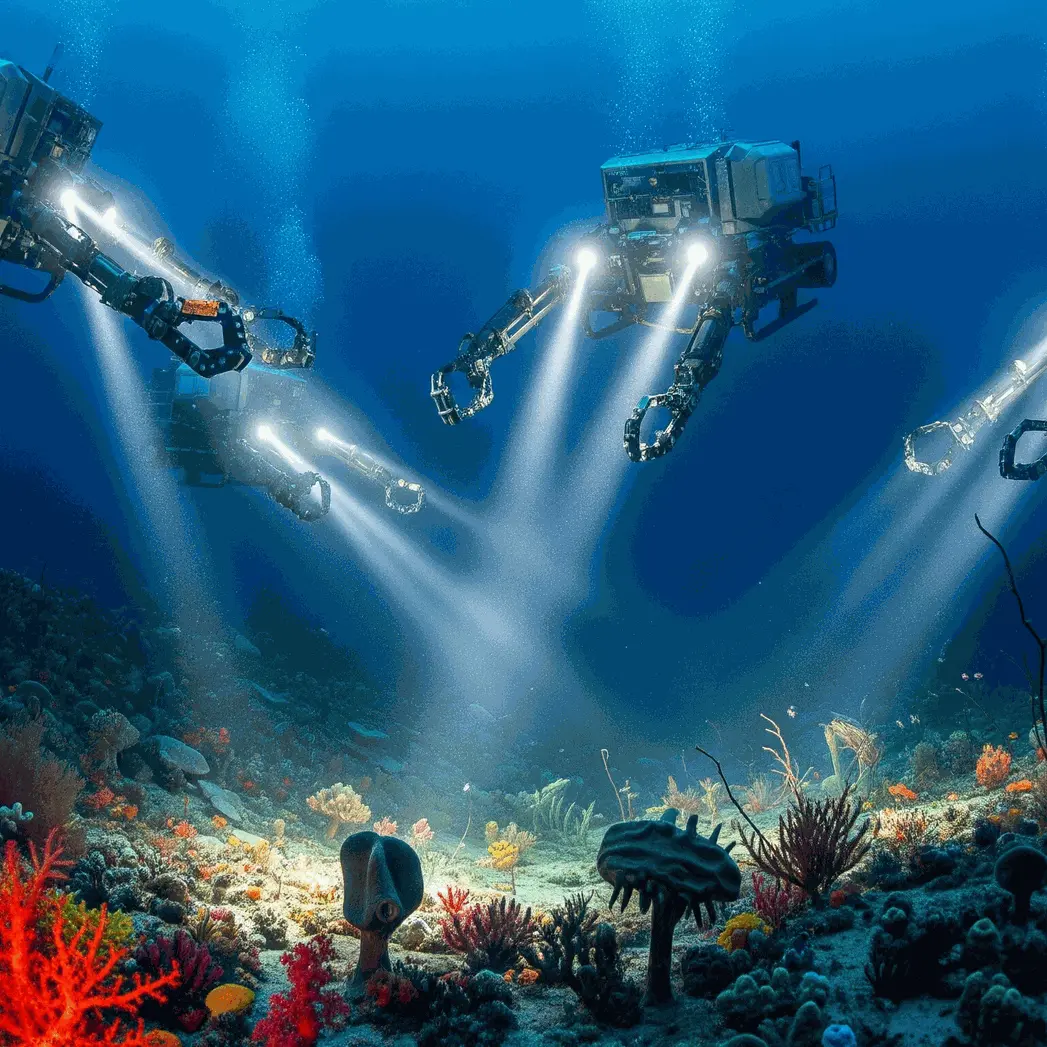Silenced Conflicts: Deep-Sea Mining and Its Implications for Human Rights
In our feature article, "Silenced Conflicts: Deep-Sea Mining and Its Implications for Human Rights," we analyze the complicated connection between deep-sea mining and basic rights. Join this interesting adventure and discover how this issue directly affects the protection of human rights.
Introduction
Deep-sea mining has garnered significant attention in recent years due to the depletion of minerals on the Earth's surface. This activity involves the extraction of valuable minerals and metals from the seabed, using advanced technologies that are often controversial. Research into deep-sea mining has revealed deposits of minerals such as manganese, nickel, cobalt, and rare earth elements in the deep ocean, sparking debate about the feasibility and sustainability of this practice.
Studies conducted in areas with potential for deep-sea mining have shown that valuable mineral reserves exist on the seabed, particularly in areas such as the Central Pacific, the Indian Ocean, and the Atlantic. However, the technology required to carry out this activity presents technical, environmental, and, particularly, ethical challenges related to human rights.
Deep-sea mining raises questions about the responsible management of marine resources, the conservation of the marine environment, and the protection of the rights of local communities that may be impacted by these activities.
The extraction of minerals from the seabed has a considerable impact on the ocean environment. Extraction methods, such as the removal of polymetallic nodules, can cause the destruction of unique marine habitats, disrupt delicate ecosystems, and pollute nearby waters.
Furthermore, the release of sediments and chemicals during deep-sea mining activities can be harmful to marine life, impacting vulnerable species and biodiversity in general. These environmental effects raise concerns about the sustainability of deep-sea mining and the need to carefully analyze its long-term consequences.
It is essential to consider the effects of deep-sea mining on the marine environment and on the communities that depend on ocean resources for their survival. The conservation of marine ecosystems and the protection of biodiversity must be central to any debate on the viability of deep-sea mining.
Deep-sea mining raises significant human rights issues, especially for local communities and Indigenous Peoples living near extraction areas. There is a danger that deep-sea mining will harm these communities, damaging their livelihoods, food security, and overall well-being.
Furthermore, the absence of clear and effective regulations on deep-sea mining can result in labor exploitation, environmental damage, and the loss of territorial rights for local communities. It is essential to address these concerns and create appropriate measures to safeguard the human rights of people who may be affected by deep-sea mining.
The connection between deep-sea mining and human rights also includes broader issues, such as the right to a healthy environment, the right to informed and meaningful participation in decisions affecting the community, and the right to sustainable development. These issues must be comprehensively assessed when analyzing how deep-sea mining impacts human rights.
History of Deep-Sea Mining
Deep-sea mining has its origins in the 20th century, when exploration of mineral resources found on the ocean floor began. With the increasing need for minerals such as manganese, nickel, cobalt, and other rare earth elements, the search for and extraction of these underwater deposits has grown. This practice has raised concerns about its potential impacts on the environment and local communities, as well as the rights of workers involved.
The topic of deep-sea mining has generated discussion about how to sustainably extract natural resources, protect the marine ecosystem, and ensure the rights of potentially harmed communities. With technological advances, the profitability of deep-sea mining has grown, leading to renewed interest and concerns about its impact on human rights worldwide.
Examining the history of deep-sea mining is essential to understand the environment in which this practice is carried out and to assess its potential impacts on human rights and the marine environment.
Deep-Sea Mining: Impact on Human Rights
Extracting minerals from the deep sea presents significant human rights challenges. One of the most serious concerns is how this affects the working conditions of those who work in this sector, as well as the repercussions for nearby communities and the socioeconomic and political conflicts that can arise from this activity.
Deep-sea mining presents unique challenges regarding safety and working conditions. Deep-sea mining activities can place workers in high-risk situations, including extreme pressure, contact with hazardous chemicals, and the operation of heavy machinery in complex environments. The lack of clear legislation and adequate monitoring can lead to exploitative situations, where employees must work in unsafe and precarious conditions without adequate protections.
Furthermore, the remoteness of many deep-sea mining sites complicates oversight and enforcement of labor laws, which can result in abuses by employers and the denial of essential labor rights, such as fair wages, adequate hours, and safe workspaces.
It is essential to address these concerns and create strong regulations that safeguard the rights of workers in deep-sea mining, ensuring their safety and well-being in a challenging and unique work environment.
Deep-sea mining also poses significant challenges to local communities that may be impacted by these activities. The extraction of minerals from the seabed can cause highly damaging environmental effects, such as the destruction of marine ecosystems, water pollution, and the disruption of local food chains.
This environmental damage can have direct repercussions for communities that depend on the ocean's resources for their lives and livelihoods. Fishing, tourism, and other local economic activities can be severely impacted, which in turn can threaten the livelihoods and food security of coastal communities.
It is vital to conduct thorough environmental assessments and meaningful consultations with local communities before initiating ocean mining projects in order to understand and reduce the potential impacts on their environment and ways of life.
Ocean mining can generate socioeconomic and political conflicts in the areas where these activities take place. The struggle for access to mineral resources, the distribution of economic gains, and decisions about the use of natural resources can lead to tensions between various stakeholder groups, such as mining companies, local governments, Indigenous communities, and environmental organizations.
These conflicts can manifest themselves through land and resource disputes, tensions within society, community mobilizations and demonstrations, as well as increased divided opinions and decreased social unity in the affected areas. Furthermore, a lack of clarity in licensing and benefit-sharing can intensify tensions and undermine trust in institutions and the rule of law.
To address these problems, it is key to promote the active involvement of all stakeholders in the decision-making process, ensure a fair and equitable distribution of the economic benefits generated by offshore mining, and foster transparency and accountability at all stages of mining activities.
Deep-sea mining can significantly impact the food security and natural resources of coastal communities. The harvesting of minerals from the seabed can disrupt aquatic ecosystems, which in turn impacts fisheries and food availability for local communities. Pollution resulting from deep-sea mining can also harm water quality and the health of marine ecosystems, affecting the availability of natural resources for coastal communities.
Furthermore, deep-sea mining can cause the destruction of marine habitats, impacting species that depend on these ecosystems for survival. The decline in marine biodiversity can directly affect the food security of coastal communities that rely on fishing and seafood harvesting for their food and sustenance. Therefore, it is essential to consider the impact of deep-sea mining on the food security and natural resources of coastal communities when analyzing its human rights implications.
In this context, a comprehensive analysis of the effects of offshore mining on food security and natural resources is needed to fully understand how this activity can impact the human rights of coastal communities and to take measures to mitigate any negative impacts.
Challenges and Controversies
Ocean mining creates a conflict of interests between companies seeking to exploit natural resources and communities that depend on marine ecosystems for their livelihoods. Mining companies frequently enter areas where local communities have practiced fishing and shellfish harvesting for years. This encroachment can lead to the loss of traditional ways of life, causing significant tensions and conflicts with these communities.
Furthermore, extracting minerals from the seabed can have highly detrimental effects on the marine environment, harming coastal communities that depend on fishing and tourism. The lack of adequate consultation and scant respect for the rights of Indigenous and local communities in decisions related to deep-sea mining creates a serious conflict of interest and raises serious human rights concerns.
The dispute over control of natural resources and the defense of traditional ways of life of coastal communities becomes a key issue in discussions about deep-sea mining and its impact on human rights.
Deep-sea mining presents significant ethical and legal challenges, as the extraction of minerals from the seabed occurs in international waters and in areas beyond the control of specific nations. This reality complicates the implementation of international norms and regulations, which can result in unethical exploitation practices and human rights violations.
Furthermore, the technologies used in deep-sea mining raise ethical concerns due to their impact on marine ecosystems. The destruction of unique marine habitats and the irreversible change in aquatic ecosystems raise serious questions about the morality of extracting resources from the ocean.
From a legal perspective, the lack of a robust international regulatory system for deep-sea mining makes it difficult to protect the human rights of affected communities. The lack of robust accountability and independent oversight mechanisms creates a legal loophole that mining companies can exploit, posing significant challenges to the protection of human rights in deep-sea mining.
The use of deep-sea resources has sparked significant global debates, particularly regarding ocean management and the protection of the marine environment. The lack of agreement on regulations and ecological standards for underwater mineral extraction has led to a heated exchange of views on the ethical and social impacts of this activity.
Furthermore, the issue of fairness in the distribution of profits from deep-sea mining has been a source of dispute, given that affected communities generally do not receive a fair share of the revenues obtained from the exploitation of deep-sea minerals.
These disputes and ethical and legal dilemmas underscore the urgency of adopting a holistic approach to addressing the effects of deep-sea mining on human rights, the conservation of the marine environment, and the long-term sustainability of coastal communities.
Global Impact
Seabed mining has garnered attention due to the potential reserves of valuable minerals found in the ocean. It is estimated that seabed mineral reserves could be worth billions of dollars, representing a significant economic opportunity for nations and companies seeking to exploit these resources. However, this economic opportunity raises questions about how the generated wealth will be distributed, as well as the clarity of commercial contracts and the protection of labor rights for those working in this new sector.
Furthermore, deep-sea mining presents challenges for the global economy in terms of regulation and oversight. The lack of a defined global regulatory framework could lead to conflicts related to resource extraction in shared maritime areas, which in turn could have repercussions on international markets and affect the economic stability of the countries involved.
Therefore, it is essential to conduct a detailed study of the economic impact of deep-sea mining, in order to fully assess both the benefits and risks involved. It is also important to establish effective oversight and governance mechanisms at the international level to ensure the protection of human rights and a fair distribution of the benefits arising from this activity.
Protecting Human Rights in Deep-Sea Mining
Deep-sea mining presents significant challenges for the defense of human rights, and governments play a vital role in regulating and supervising these activities. These governments must create robust laws that protect the rights of local communities and workers, as well as ensure the conservation of the marine environment. They must also carry out effective oversight to ensure compliance with laws and regulations, as well as take corrective action if they are violated.
Additionally, governments have a duty to consult and collaborate closely with local communities and Indigenous Peoples who may be impacted by deep-sea mining. This means respecting their right to early and well-informed consultation, in accordance with international human rights standards. They must also ensure that these communities have access to effective means to lodge complaints and file claims if their rights are violated.
Likewise, governments must promote transparency in the granting of permits and contracts for the exploitation of mineral resources in international waters and ensure that the companies involved comply with international human rights standards in all their activities.
The defense and promotion of human rights are essential to safeguarding communities suffering the consequences of deep-sea mining. Civil society organizations, human rights defenders, and environmental activists are key in raising awareness about rights abuses, educating about the impacts of deep-sea mining, and seeking fair and sustainable solutions for affected communities.
These organizations are vital in monitoring mining activities, recording environmental and social impacts, and pressuring governments and companies to respect human and environmental rights. They also provide assistance to local communities, strengthening their capacity to defend themselves and participate in decisions that affect them.
Human rights advocacy and activism also encompass the promotion of sustainable mining methods and the search for economic alternatives for communities that are not based exclusively on the extraction of natural resources.
In response to the problems posed by deep-sea mining, several initiatives have been suggested to safeguard the human rights of affected communities. These initiatives include the creation of independent monitoring systems for mining operations, the strengthening of national and international laws and regulations, and the promotion of due diligence and accountability for the companies involved.
Additionally, the adoption of development approaches that place local communities at the center and respect their rights has been recommended, as well as the promotion of active and effective participation of these communities in decisions regarding the exploitation of resources in their areas. The need for comprehensive and transparent environmental and social assessments, conducted in conjunction with affected communities and with full respect for their rights, has also been highlighted.
These proposals seek to ensure that deep-sea mining is carried out sustainably, respecting human rights, protecting the marine environment, and contributing to the sustainable development of local communities.
Conclusions
Seabed mining presents significant challenges for the long-term protection of human rights. Harvesting minerals from the ocean floor can cause irreversible damage to the environment, which in turn could harm the livelihoods of local communities and Indigenous Peoples who depend on the sea for their livelihoods. Furthermore, the lack of strong regulations and adequate oversight could intensify labor rights violations, resulting in hazardous working environments and worker exploitation.
On the other hand, deep-sea mining also offers an opportunity to meet the growing need for minerals used in current technology, which could alleviate pressure on terrestrial ecosystems. The introduction of strict regulations for the protection of the environment and society, along with the meaningful participation of local communities and Indigenous Peoples, could facilitate a more ethical and sustainable approach to deep-sea mining, one that respects both human rights and the environment. The long-term impact of deep-sea mining on human rights will largely depend on the decisions and actions taken today to regulate and supervise this emerging sector.
It is essential to proactively address these challenges to prevent human rights violations and irreversible damage to the marine environment.
The defense of human rights in deep-sea mining faces significant challenges, ranging from the lack of effective regulatory systems to the difficulty of monitoring and enforcing regulations in remote and hard-to-reach locations. The pressure to meet the need for essential minerals for the global economy often collides with the imperative to safeguard the rights of local communities and marine ecosystems.
However, there are also opportunities to strengthen the protection of human rights in deep-sea mining. The development of innovative technologies to monitor and mitigate environmental impacts, the active participation of affected communities in decision-making, and the adoption of robust international standards could lay the foundation for more ethical and responsible deep-sea mining.
It is crucial to recognize both the challenges and benefits and to collaborate with all stakeholders to appropriately manage risks and promote sustainable practices that safeguard human rights in the context of deep-sea mining.
To ensure the safeguarding of human rights in deep-sea mining, specific actions at both the national and international levels are essential. This involves creating robust regulations that address the specific challenges of deep-sea mining, establishing effective monitoring and enforcement systems, and promoting clarity and accountability throughout the value chain related to deep-sea mining.
It is also essential to include local communities and Indigenous Peoples in the decision-making process, ensuring their meaningful participation and respect for their rights, which are protected by national and international laws. Cooperation between government administrations, industry, civil society organizations, and human rights experts will be key to addressing current problems and ensuring that deep-sea mining fully respects human rights and the natural environment.
Finally, safeguarding human rights in deep-sea mining will require a comprehensive approach that balances the demand for minerals with the protection of marine ecosystems, as well as respect for the rights of affected communities. Only through determined commitment and coordinated action can deep-sea mining that is genuinely sustainable and respects human rights be achieved.

 IHRO NEWS
IHRO NEWS

